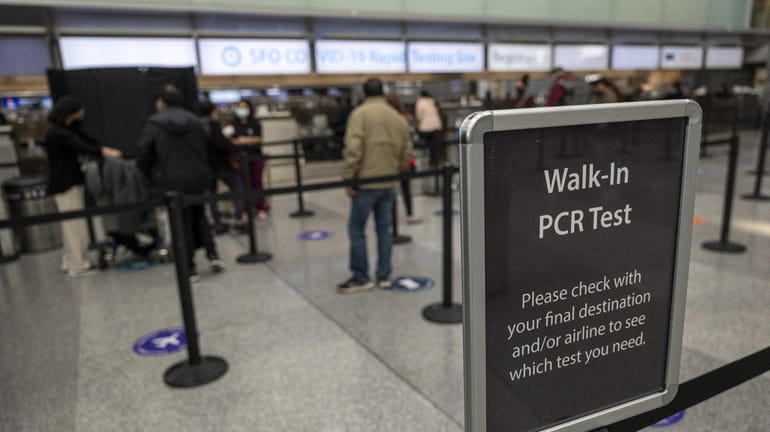Questions about the omicron variant and travel, answered

Under anticipated new rules, all travelers flying into the United States would have to take a test one day before boarding. Credit: Bloomberg/David Paul Morris
As countries around the world react to the new and little-understood omicron variant of the coronavirus, travelers are once again facing unexpected border closures, evolving entry rules and a dark cloud of potential cancellations.
Here are key questions and answers for travelers in light of the latest developments.
Should I cancel my trip abroad?
The World Health Organization warned that some groups of people should postpone travel to areas with community spread of the virus. That includes people who are unvaccinated or who have not previously been infected, those 60 or older, or anyone with preexisting medical conditions that put them at greater risk of severe illness.
Are there any new restrictions on domestic travel?
Currently, domestic travel was carrying on as normal — or at least COVID-era normal. That means masks are required in airports and on planes, trains, and other forms of public transportation. Some locations may emphasize mask-wearing; New York City, for example, is strongly recommending that people wear masks indoors in public places.
What do I have to do if I'm returning to the U.S. from a foreign country?
Anyone flying into the country is required to test negative within three days of their flight. Under the anticipated new rules, all travelers flying into the United States would have to take a test one day before boarding. Officials are also considering whether they will require all passengers to get tested again within three to five days of arriving. They are discussing the possibility of a seven-day self-quarantine measure.
Starting Dec. 5, the United States restricted travel from South Africa and seven other countries. Other regions and countries, including the European Union, Britain, Japan and Israel, also set restrictions for air travelers arriving from southern Africa. The restrictions will apply to travelers from South Africa, Botswana, Zimbabwe, Namibia, Lesotho, Eswatini, Mozambique and Malawi.
What do I have to do if I'm leaving the country?
Border rules vary according to destination — and travelers should be aware those rules could change fast. The United Kingdom, for example, recently announced that anyone coming to the country will need to self-isolate until they get a negative PCR result. They will have to take the test by the end of their second day in the country. Canada is also requiring air travelers to test upon arrival and quarantine until they have results, though anyone coming from the United States is exempt.
Is anywhere completely off limits?
A small number of countries have put broad travel bans in place. Currently, noncitizens are not allowed to visit Israel for two weeks. Morocco suspended incoming air travel for two weeks as of Dec. 6, the Associated Press reported. And Japan is keeping all nonresident foreigners out of the country for at least a month.
How can I keep track of rule changes?
Airlines are supposed to keep travelers updated on the rules they need to follow in their destinations. And the U.S. State Department urges travelers to check embassy websites and the department's website (travel.state.gov) for information such as entry and exit rules, testing availability and quarantine information.
